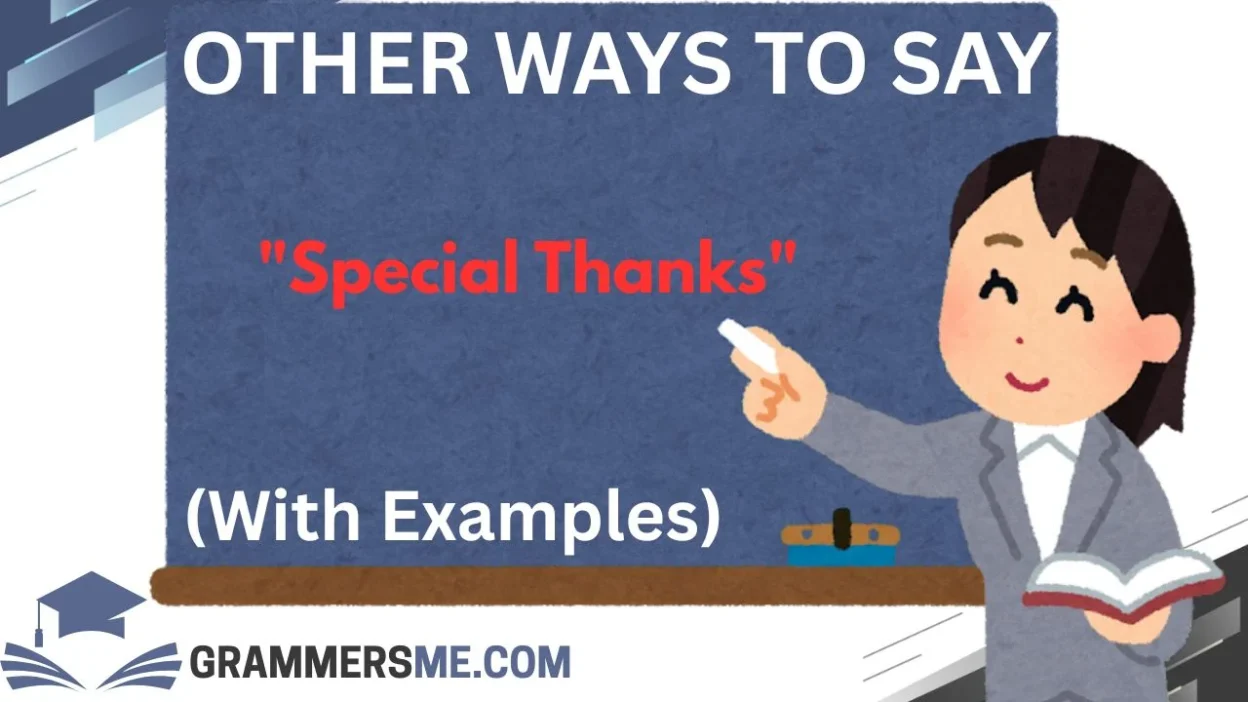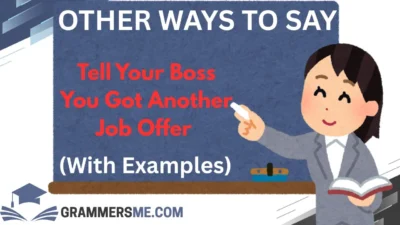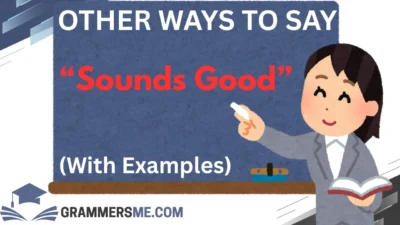Expressing gratitude is a simple yet powerful way to connect with others and show appreciation. While saying “special thanks” is a wonderful sentiment, there are many ways to convey your gratitude in a way that feels even more personal and thoughtful. Whether you’re writing a thank-you note, sending an email, or expressing appreciation in a casual conversation, it’s important to find words that feel sincere.
By diversifying your vocabulary, you can tailor your message to fit the tone of the situation and the nature of your relationship with the recipient. This article will help you discover 30 alternatives to saying “special thanks” that will elevate your communication and make your appreciation even more meaningful.
What Does “Special Thanks” Mean?
“Special thanks” is a phrase used to express gratitude in a more personalized or emphasized way, often reserved for someone who went above and beyond in their efforts. It’s not just a routine expression of thanks but a way of recognizing someone’s extraordinary contributions or kindness. It is commonly used in speeches, awards, or when you want to acknowledge someone who played a significant role in your success.
Is It Professional/Polite to Say “Special Thanks”?
Yes, “special thanks” can be both professional and polite. It’s especially appropriate when acknowledging someone’s help or support in a way that stands out. However, it’s important to ensure the context is right—using it in the wrong situation can make it sound overly casual or insincere. The key is to match the level of gratitude with the nature of the gesture or help received.
1. I Truly Appreciate It
Meaning: A sincere expression of gratitude that emphasizes the importance of the favor or help.
Detailed Explanation: This phrase conveys deep appreciation, indicating that the gesture made a genuine impact.
Scenario Example: “I truly appreciate your effort in helping me complete the project on time.”
Best Use: Ideal for both professional and personal contexts, especially when you want to express heartfelt thanks.
Not Use: Avoid it when the assistance was minor or you don’t feel strongly about the gesture.
Tone: Warm, grateful, and sincere.
2. I Can’t Thank You Enough
Meaning: An expression of profound gratitude, suggesting that words are insufficient to express your appreciation.
Detailed Explanation: This phrase emphasizes how much the person’s actions mean to you and shows that no amount of thanks could be enough.
Scenario Example: “I can’t thank you enough for all the support you’ve given me during this difficult time.”
Best Use: Best for significant acts of kindness or when you want to show that you are truly overwhelmed by the gesture.
Not Use: Don’t use it for small favors where “thank you” would suffice.
Tone: Overwhelmed, sincere, and emotional.
3. I’m Grateful Beyond Words
Meaning: A deep expression of gratitude when you’re at a loss for words.
Detailed Explanation: This phrase is used when the act of kindness or support is so impactful that regular words feel insufficient.
Scenario Example: “I’m grateful beyond words for everything you’ve done to help me succeed.”
Best Use: Suitable for expressing appreciation when someone has made a big impact or performed an extraordinary favor.
Not Use: Not appropriate for minor acts or casual thanks.
Tone: Deeply thankful, humbled, and emotional.
4. I Appreciate Your Thoughtfulness
Meaning: A thank-you phrase that emphasizes the person’s consideration and care.
Detailed Explanation: This expresses appreciation for not just the act itself but the thought behind it, showing that you recognize the care involved.
Scenario Example: “I appreciate your thoughtfulness in remembering my birthday even though we haven’t talked in a while.”
Best Use: Ideal for situations where someone has been considerate or mindful.
Not Use: Don’t use it for acts that seem obligatory or expected.
Tone: Grateful and reflective.
5. I’m Deeply Thankful
Meaning: An expression of strong gratitude that conveys more than casual thanks.
Detailed Explanation: This shows that you’re not just thankful, but profoundly moved by the person’s actions.
Scenario Example: “I’m deeply thankful for your support during my recovery.”
Best Use: Best for serious or significant acts of kindness.
Not Use: Inappropriate for everyday or minor actions.
Tone: Serious, heartfelt, and sincere.
6. You Have My Gratitude
Meaning: A formal way to express appreciation, highlighting the debt of gratitude you feel.
Detailed Explanation: This phrase is a bit more formal, and it’s often used in professional contexts or when you want to sound polished.
Scenario Example: “You have my gratitude for taking on such a challenging task at work.”
Best Use: Perfect for formal letters or situations where you need to show respect.
Not Use: Avoid using it in casual or personal conversations where a simpler thanks would feel more genuine.
Tone: Respectful, formal, and appreciative.
7. I’m So Thankful
Meaning: A warm, casual way to express gratitude, implying strong feelings of appreciation.
Detailed Explanation: This phrase conveys an emotional response and is typically used when someone has gone out of their way to help you.
Scenario Example: “I’m so thankful for your patience while I was learning the ropes at my new job.”
Best Use: Casual settings, informal emails, and conversations with friends or close colleagues.
Not Use: Don’t use it in formal settings or when the gratitude is more professional.
Tone: Friendly, warm, and appreciative.
8. Much Appreciated
Meaning: A concise and polite expression of gratitude.
Detailed Explanation: This is a less formal way to express thanks, typically used in professional or more neutral contexts.
Scenario Example: “Much appreciated for stepping in at the last minute and presenting the report.”
Best Use: In professional emails or when you need to express appreciation quickly and without too much emotion.
Not Use: Not ideal for situations where a more personal or emotional thanks would be better.
Tone: Polite, neutral, and professional.
9. I Owe You One
Meaning: A casual way to show that you feel indebted to someone for their help.
Detailed Explanation: This phrase expresses gratitude while also implying a willingness to reciprocate the favor in the future.
Scenario Example: “Thanks for covering for me at the meeting—I owe you one!”
Best Use: Casual, informal settings, often with friends or close colleagues.
Not Use: Not appropriate for formal contexts.
Tone: Friendly, lighthearted, and informal.
10. Thank You from the Bottom of My Heart
Meaning: A deeply heartfelt expression of gratitude, emphasizing that the thanks come from a sincere and deep place.
Detailed Explanation: This phrase indicates that the appreciation is not superficial but comes from genuine emotion.
Scenario Example: “Thank you from the bottom of my heart for your kindness during my personal struggles.”
Best Use: Best for significant acts of kindness, especially in personal relationships.
Not Use: Not appropriate for minor gestures.
Tone: Sincere, emotional, and profound.
11. Endless Thanks
Meaning: An expression that implies ongoing and overflowing gratitude.
Detailed Explanation: This phrase emphasizes that your appreciation doesn’t stop—it continues because the act meant that much to you.
Scenario Example: “Endless thanks for your support through every step of this journey.”
Best Use: Use this when someone has been consistently helpful or supportive.
Not Use: Avoid for one-time, minor gestures.
Tone: Warm, expressive, and heartfelt.
12. Thanks a Million
Meaning: A playful, exaggerated way to say thank you.
Detailed Explanation: Though informal, it still conveys genuine gratitude with a touch of friendliness.
Scenario Example: “Thanks a million for helping me move over the weekend!”
Best Use: Great in friendly, informal conversations.
Not Use: Not suitable for very formal or professional situations.
Tone: Cheerful, lighthearted, and casual.
13. Sincere Thanks
Meaning: A polite and formal expression that highlights genuine appreciation.
Detailed Explanation: It shows your thanks are not just routine, but felt deeply and meant sincerely.
Scenario Example: “Please accept my sincere thanks for your mentorship.”
Best Use: Perfect for formal writing, such as thank-you letters or speeches.
Not Use: Too formal for casual chats with friends.
Tone: Polished, respectful, and professional.
14. I’m Forever Grateful
Meaning: A powerful way to say your appreciation will last a long time.
Detailed Explanation: This expression highlights lasting impact—when someone has done something truly unforgettable.
Scenario Example: “I’m forever grateful for your help when I was struggling.”
Best Use: Use for deeply personal or meaningful experiences.
Not Use: Don’t use it casually; it can sound dramatic if the context doesn’t match.
Tone: Deep, sincere, and emotionally resonant.
15. Many Thanks
Meaning: A simple, polite expression of gratitude.
Detailed Explanation: It’s slightly more formal than “thanks,” and works well when you want to keep things professional but still warm.
Scenario Example: “Many thanks for forwarding that document so quickly.”
Best Use: Emails, messages, and formal or semi-formal situations.
Not Use: Can sound too mild for very emotional situations.
Tone: Polite, professional, and versatile.
16. Heartfelt Thanks
Meaning: A thank you that comes from the heart.
Detailed Explanation: Emphasizes that your gratitude is genuine and emotional.
Scenario Example: “Heartfelt thanks for being there during one of the toughest times in my life.”
Best Use: When you want to show vulnerability or sincere emotion.
Not Use: Don’t use in impersonal business settings.
Tone: Warm, sincere, and personal.
17. I’m Humbled and Grateful
Meaning: Expresses both humility and appreciation.
Detailed Explanation: This phrase works beautifully when someone’s gesture has left you feeling touched and honored.
Scenario Example: “I’m humbled and grateful to receive this award—it wouldn’t have been possible without your help.”
Best Use: Ideal for speeches, awards, or formal acknowledgments.
Not Use: May sound overly formal in casual conversation.
Tone: Honored, emotional, and respectful.
18. Much Obliged
Meaning: A traditional phrase that means you’re thankful and feel indebted.
Detailed Explanation: While a bit old-fashioned, it’s still charming in the right context.
Scenario Example: “Much obliged for taking care of things while I was away.”
Best Use: Light, polite, and slightly formal conversations.
Not Use: Can sound outdated or sarcastic if not used sincerely.
Tone: Polite, old-school charm, and formal.
19. I’m So Touched
Meaning: Shows that someone’s gesture emotionally affected you.
Detailed Explanation: This phrase emphasizes emotional impact and personal significance.
Scenario Example: “I’m so touched by your generosity—it truly means the world to me.”
Best Use: Perfect when someone’s kindness surprised or moved you.
Not Use: Don’t use for routine help or favors.
Tone: Emotional, heartfelt, and appreciative.
20. My Sincere Gratitude
Meaning: A formal and respectful way to express true thanks.
Detailed Explanation: Adds depth and polish, often used in writing or public speaking.
Scenario Example: “Please accept my sincere gratitude for your continued guidance and trust.”
Best Use: Ideal for letters, presentations, or official acknowledgments.
Not Use: Too formal for friendly or casual exchanges.
Tone: Professional, gracious, and dignified.
21. I’m Eternally Grateful
Meaning: A strong expression of long-lasting, deep appreciation.
Detailed Explanation: This phrase conveys a sense of lifelong gratitude—perfect for gestures that had a profound or life-changing impact.
Scenario Example: “I’m eternally grateful for the way you stood by me during that crisis.”
Best Use: Use it when someone has made a significant difference in your life.
Not Use: Avoid for casual or day-to-day help—it may sound overly intense.
Tone: Emotional, sincere, and profound.
22. Thanks a Ton
Meaning: A fun, informal way to express big thanks.
Detailed Explanation: It’s a playful exaggeration, showing you’re genuinely thankful in a casual way.
Scenario Example: “Thanks a ton for picking up lunch today!”
Best Use: Perfect for light-hearted conversations with friends or coworkers.
Not Use: Not suited for formal situations or professional writing.
Tone: Casual, upbeat, and friendly.
23. A Million Thanks
Meaning: An enthusiastic and expressive way to show big gratitude.
Detailed Explanation: Similar to “thanks a million,” but with a slightly more elegant twist.
Scenario Example: “A million thanks for making my birthday so special!”
Best Use: Personal messages, thank-you cards, or social media posts.
Not Use: Too informal for corporate or formal settings.
Tone: Joyful, appreciative, and expressive.
24. I’m Honored and Thankful
Meaning: Combines a sense of privilege with appreciation.
Detailed Explanation: This is a gracious phrase used to express that someone’s action made you feel truly valued and humbled.
Scenario Example: “I’m honored and thankful to have been part of such an incredible team.”
Best Use: Speeches, award acceptances, or professional acknowledgments.
Not Use: Too formal for quick, casual conversations.
Tone: Respectful, polished, and heartfelt.
25. Much Gratitude
Meaning: A simple yet elegant phrase of thanks.
Detailed Explanation: Slightly more refined than “thank you,” it carries a tone of calm sincerity.
Scenario Example: “Much gratitude for your advice during my transition.”
Best Use: Suitable for emails, handwritten notes, and speeches.
Not Use: Might sound too formal in quick texts or casual conversation.
Tone: Gentle, polished, and appreciative.
26. Infinite Thanks
Meaning: A poetic way of saying your gratitude knows no bounds.
Detailed Explanation: This phrase adds a touch of drama and charm, emphasizing the depth of your appreciation.
Scenario Example: “Infinite thanks for your unwavering support and belief in me.”
Best Use: Best in personal letters, notes, or posts where emotional tone fits.
Not Use: Can be too dramatic for very small gestures.
Tone: Poetic, heartfelt, and expressive.
27. With All My Thanks
Meaning: A sincere, endearing way to wrap up your gratitude.
Detailed Explanation: Often used at the end of letters or notes, this phrase is simple yet impactful.
Scenario Example: “With all my thanks, I remain grateful for your generosity.”
Best Use: Endings of written correspondence, both personal and professional.
Not Use: Doesn’t suit verbal thank-yous or very casual messages.
Tone: Thoughtful, classic, and graceful.
28. I’m Beyond Thankful
Meaning: Expresses gratitude that surpasses ordinary thankfulness.
Detailed Explanation: When you’re so appreciative that even the strongest words feel like they’re not quite enough.
Scenario Example: “I’m beyond thankful for how you believed in me when no one else did.”
Best Use: When you want to show intense emotional thanks, especially in personal messages.
Not Use: May sound too dramatic for small acts.
Tone: Emotional, intense, and warm.
29. I Genuinely Appreciate It
Meaning: Emphasizes that your appreciation is real and not just out of politeness.
Detailed Explanation: It works great when you want to avoid sounding robotic or overly formal.
Scenario Example: “I genuinely appreciate your honesty and the time you took to help.”
Best Use: Emails, conversations, and messages where clarity and sincerity matter.
Not Use: Less suited for poetic or emotional messages.
Tone: Honest, respectful, and grounded.
30. Endless Gratitude
Meaning: A poetic way to show that your appreciation has no end.
Detailed Explanation: Similar to “infinite thanks,” but carries a slightly more refined tone. It works especially well in sentimental or emotional expressions.
Scenario Example: “With endless gratitude, I thank you for your guidance throughout my career.”
Best Use: Writing thank-you notes, public acknowledgments, or heartfelt speeches.
Not Use: Might feel too much for basic appreciation.
Tone: Elegant, sincere, and warm.
Final Thoughts
There’s nothing wrong with saying “special thanks”, but choosing a more personalized phrase can truly elevate your message. Whether you’re writing a speech, an email, a thank-you card, or sending a quick note of appreciation, these 30 thoughtful alternatives give you the flexibility to sound authentic, warm, and appropriately tuned to your audience.
I’ve used many of these in my own professional and personal life, and they’ve always been received with warmth and sometimes even surprise—because when your words are intentional, people notice.
More FAQs About Expressing Gratitude Thoughtfully
1. How do I know which phrase to use?
Think about the tone you want—formal, friendly, emotional—and the relationship with the person you’re thanking.
2. What’s the difference between “special thanks” and “heartfelt thanks”?
“Heartfelt thanks” carries more emotional weight and implies deeper sincerity, while “special thanks” can be more general.
3. Can I use these phrases in business emails?
Yes—just choose the more professional ones like “Much appreciated,” “Sincere thanks,” or “You have my gratitude.”
4. Is it okay to repeat the same thank-you phrase often?
You can, but varying your expression of gratitude can make your messages feel more genuine and less routine.
5. What’s a good way to end a thank-you email?
Try ending with “With all my thanks,” or “Much gratitude,” followed by your name—it’s warm yet polished.




